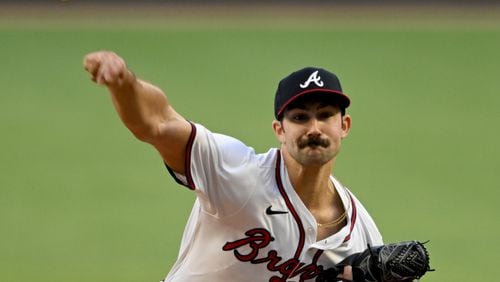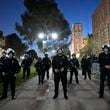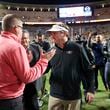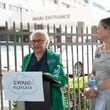In one way, Spencer Strider is like the rest of us, or at least some of us. When the “check engine” light came on for his elbow, he chose to ignore it.
As the Braves ace prepared for the season at spring training in Florida, he began to feel discomfort in his right elbow but tried to not listen to what he called “those apocalyptic thoughts in my mind.”
Apocalyptic, as in a tear of the ulnar collateral ligament in his elbow, which would require season-ending Tommy John surgery. It would have been his second. The fact that he finished the spring with a 0.79 ERA probably helped convince him to delay a trip to the mechanic, as it were.
(Apologies if the idea of ignoring the “check engine” light is giving you anxiety. As someone who routinely ignores the “0 miles to empty” warning, I confess I do not easily feel your pain.)
It was only after his second start of the season, when his performance finally faltered, that he chose to speak up. Imaging tests revealed that, as he put it, he had a “big bone floating in my arm.” (In other words, the tip of his humerus – the upper arm bone – had broken off and had apparently lodged in the UCL.)
And, as such, Spencer met with media Friday before the Braves-Rangers game at Truist Park to give a briefing on his UCL, which has been stabilized with an internal brace. Because it wasn’t a significant tear, he was able to avoid the second Tommy John surgery of his career.
“The (UCL) tissue’s actually really good,” said Strider, his right arm in a sling. “I didn’t have a tear necessarily, but it became a problem and we had to deal with it surgically.”
With the brace surgery as opposed to the Tommy John procedure, he could be back as early as the start of the 2025 season.
“Of course, it was up to me, I’d try to pitch tomorrow,” said Strider, who actually probably would.
You’ll not encounter many baseball players – or people – quite like Strider. On top of having an uncommonly powerful right arm, he is intelligent, dedicated and purposeful. He is someone who has used the Braves’ road trips to explore the cities where they’re playing. He has been a journal keeper. He taught himself to play the guitar in his childhood and, at least as of last year, was maintaining a spread sheet that ranked indie-rock albums.
After he tore his UCL at Clemson in 2019 and had Tommy John surgery, he changed his approach. With the help of a Clemson sports psychologist, he sought to understand his motivation and purpose. He reshaped his pitching mechanics to ensure that the devastating injury wouldn’t happen again.
And, within three years of the Braves drafting him in 2020, he had become one of the top pitchers in the game.
“Does everything right from being a great teammate, person,” manager Brian Snitker said of Strider two weeks ago after it was revealed that he had damaged his UCL. “The dedication to what he does in everything. I hate (the injury) for him because he enjoys it so much.”
And in a comment made Friday, Strider revealed a little more of his uncommon mindset, one he has used to separate himself from thousands of other rocket-armed talents and reach the top of the baseball pyramid. Some people, he said, think of an injury or adversity as a pause button. He called that dangerous thinking.
“That implies an assumption that you’re trying to get back and that, when you press play again, you’re going to be the same thing,” he said, describing an entirely rational way of thinking. “Which, I don’t know why you’d want to be the same thing. If you ask any healthy player, they’re going to tell you that in a year from now, they want to be a better player in every way, a better person.”
That being the case, an injury is not an obstacle to Strider, but merely a different path to pursue improvement. This wasn’t the annoying guy who tries to put a positive spin on everything. It actually seemed to be his genuine way of looking at it, more borne from pragmatism than hokey optimism.
My experience with athletes at this level is that physical gifts are only part of the reason why they’ve made it that far. A lot of the rest of it has to do with competitiveness, intelligence and motivation – the compulsion to do much more than the average person to win, the ability to learn and apply knowledge and the willingness to do more (training, nutrition, rest) than others.
Strider’s commentary on the potential utility of injuries provided another example of what has helped him rise above his competition, a tool as valuable as his fastball.
“There’s always an uncontrollable element to injuries and to the game, and that’s what makes the game cool,” he said. “You’ve got to embrace it and make the most of it.”
Strider will undergo his rehab in Atlanta. He probably won’t completely disappear from the team, although – and here’s another insight into his psyche – he said that he didn’t want to distract the team from its pursuit of the World Series title that he direly wants to be a part of. (Another quote: “These guys don’t need me to win a World Series.”)
“The best thing I can do is make sure that, when I’m able to play, that I’m effective and I can help the team win,” he said.
As for what to expect when he resurfaces, no one who knows Strider will be surprised if he’s somehow a better player and a better person, too.







